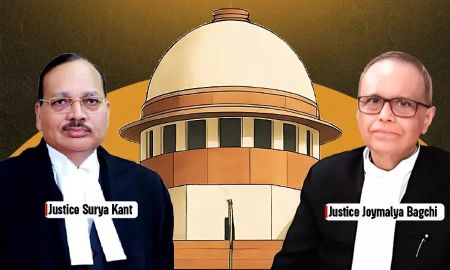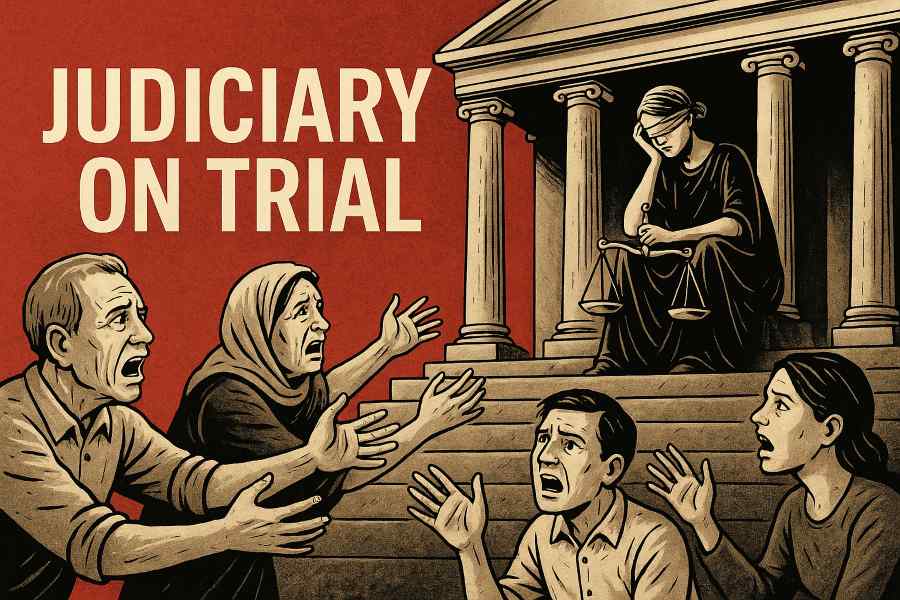Court questions Punjab’s use of Central funds meant for judiciary.
THE SUPREME COURT on Friday issued a scathing warning to the Punjab government, stating that any inquiry into the State’s handling of Central grants for judicial infrastructure would likely reveal diversion of funds meant exclusively for the judiciary.

Justice Surya Kant and Justice Joymalya Bagchi questioned the State over delays and possible fund diversion.
Hearing Punjab’s appeal against orders of the Punjab and Haryana High Court, a Bench of Justice Surya Kant and Justice Joymalya Bagchi said it was deeply dissatisfied with the State’s failure to provide even the most basic courts and residential facilities for judges in Malerkotla, the newest district of Punjab.
Justice Kant, who has presided over several judicial infrastructure matters from Punjab during his tenure, did not conceal his frustration. At one point, he remarked that if the Supreme Court were to order a probe, it would become evident that Central grants earmarked for judicial buildings had already been “consumed for other purposes.”
The suggestion was direct and pointed — that funds intended specifically for courts may have been diverted by the State machinery, leaving the judiciary starved of essential facilities.
High Court’s Stern Orders and State’s Delays
The High Court had earlier recorded that although Malerkotla was declared a revenue district in June 2021 and was granted a separate sessions division in August 2023, the State had failed to build permanent courtrooms for the District and Sessions Judge or for other judicial officers.

The Punjab and Haryana High Court had directed immediate allocation of residential and court facilities in Malerkotla.
The State had also not provided designated residential quarters for the District Judge, even though it had allocated accommodation for other administrative officers much more quickly. This disparity, the Supreme Court noted, reflected the State’s skewed priorities.
The High Court, after waiting months for compliance, passed a stronger order on September 12 directing that the Deputy Commissioner’s guest house and a residence occupied by the Senior Superintendent of Police be immediately vacated and allotted to the District and Sessions Judge.
When Punjab filed a review petition seeking a recall of this direction, the High Court said the plea “bordered on contempt” and summoned the Secretary (Justice) to personally appear and explain the delay. It was after this stern message that the State decided to approach the Supreme Court.
Punjab’s Defence Fails to Convince Apex Court
Before the apex court, Advocate General Maninderjit Singh Bedi and Senior Advocate Abhishek Manu Singhvi argued that the High Court’s observations were excessive and that the State had already taken significant steps, including creating posts and sanctioning facilities for Malerkotla. They stressed that the criticism ignored the State’s overall progress in judicial infrastructure across Punjab.
Singhvi submitted that the original PIL was limited to certain facilities and that the State had already made alternate arrangements “elsewhere,” though he acknowledged that some work in Malerkotla remained ongoing.

CM Bhagwant Mann and AAP supremo Arvind Kejriwal. The Supreme Court remarked that Malerkotla’s district status appeared politically convenient but lacked corresponding judicial infrastructure planning.
Justice Kant, however, found these explanations inadequate. He said the State had not been able to point to a single project that had been fully completed. He questioned why Punjab could easily arrange housing for administrative officials but was unable or unwilling to provide accommodation for a Sessions Judge.
He further observed that Malerkotla appeared to have been declared a district “for political appeasement,” even though no basic judicial infrastructure was in place.
The implication was unmistakable — that the decision to elevate Malerkotla as a district may have been politically convenient, but the government had not taken responsibility for ensuring that courts, which are foundational to district administration, received their due share of planning and funding.
Court Flags Chronic Underfunding of Judiciary
Justice Bagchi added that the situation reflected a much larger national problem. He pointed out that the judiciary across India operates with severely inadequate budgetary support, often relying on centrally sponsored schemes whose funds are either delayed or diverted by States.
He stated that the time had come for prescribing a minimum allocation for the judiciary in both Union and State budgets, noting that the total funding for justice delivery does not even come close to one percent of the GDP.
The observation underscored the chronic underinvestment in courts, which has long contributed to delays, poor infrastructure, and a justice system that struggles to keep pace with rising caseloads.
Faced with the Court’s stern remarks, Singhvi sought permission to withdraw the appeal and approach the High Court again with a detailed status report and request for more time. The Supreme Court allowed the withdrawal and clarified that the State should not be denied a hearing on technical grounds when it seeks modification or extension of time before the High Court.
The Court also recorded that the State remained bound by the compliance dates set in the High Court’s September 12 order.
The Supreme Court’s observations serve as a strong reminder that judicial infrastructure, long neglected by many States, is not merely an administrative concern but a constitutional obligation.
In Punjab’s case, the apex court has now made it clear that the State will have to account for every rupee meant for the judiciary — and that an inquiry, if ordered, may expose uncomfortable truths. ![]()
_________
Also Read:
Disclaimer : PunjabTodayNews.com and other platforms of the Punjab Today group strive to include views and opinions from across the entire spectrum, but by no means do we agree with everything we publish. Our efforts and editorial choices consistently underscore our authors’ right to the freedom of speech. However, it should be clear to all readers that individual authors are responsible for the information, ideas or opinions in their articles, and very often, these do not reflect the views of PunjabTodayNews.com or other platforms of the group. Punjab Today does not assume any responsibility or liability for the views of authors whose work appears here.
Punjab Today believes in serious, engaging, narrative journalism at a time when mainstream media houses seem to have given up on long-form writing and news television has blurred or altogether erased the lines between news and slapstick entertainment. We at Punjab Today believe that readers such as yourself appreciate cerebral journalism, and would like you to hold us against the best international industry standards. Brickbats are welcome even more than bouquets, though an occasional pat on the back is always encouraging. Good journalism can be a lifeline in these uncertain times worldwide. You can support us in myriad ways. To begin with, by spreading word about us and forwarding this reportage. Stay engaged.
— Team PT


